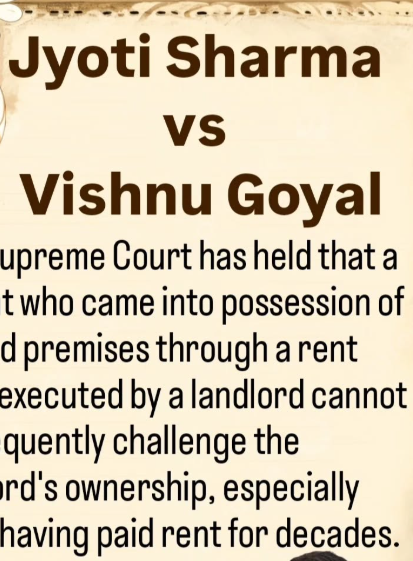Table of Contents
New Delhi, 2025 — In a rare and long-running tenancy battle, the Supreme Court of India has ruled that a tenant who had occupied a shop since 1953 cannot now dispute the landlord’s ownership after accepting him for seven decades. The Court invoked the principle of estoppel, stating that once a tenant enters property under a landlord and pays rent to him, he cannot later deny that landlord’s title.
The case, Jyoti Sharma vs. Vishnu Goyal (2025), involved a shop in Indore where the original tenant, Kishan Lal, had executed a rent deed with landlord Ramji Das in 1953. After Ramji Das’s death, the property was passed on to his daughter-in-law, Jyoti Sharma, through a registered will.
Tenant Suddenly Claimed the Landlord Was Not the Owner
After more than 70 years, the tenant’s family argued that Ramji Das was never the real owner, claiming the shop actually belonged to his uncle, Sua Lal. They also questioned the validity of the will that transferred the property to Jyoti Sharma.
However, the Supreme Court noted that:
- The tenants paid rent for decades, acknowledging Ramji Das as their landlord.
- A 1953 relinquishment deed proved that the property had indeed been transferred to Ramji Das.
- A probate order in 2018 confirmed the will’s validity.
The bench observed that the tenants were attempting to “turn around and challenge ownership after benefiting for seven decades,” which the law does not permit.
Court Restores Landlord’s Rights
Calling earlier lower-court findings “perverse,” the Supreme Court restored Jyoti Sharma’s right over the property. It also upheld her bona fide need to expand her sweets and savouries business into the disputed shop.
6 Months to Vacate
The Court has ordered the tenants to:
- Vacate the shop within 6 months,
- Pay rent arrears dating back to January 2000, and
- Clear all outstanding dues before handing over possession.
What the Court Emphasised
The key principle highlighted was estoppel:
If you enter the premises as a tenant under someone, you cannot later deny that person’s ownership.
This ruling is expected to become a significant reference for future landlord-tenant disputes involving long-term occupancy and challenges to ownership.




